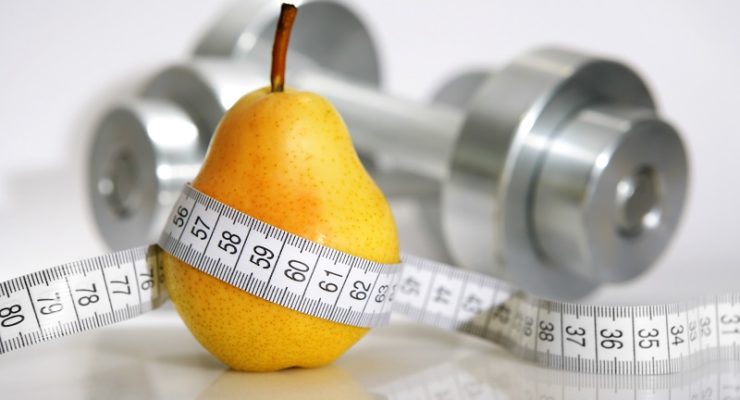It can seem like every fat-loss article is targeted at losing belly fat. However, if you have a pear-shaped body, there’s a lot less fat loss advice for you.
There’s a reason the info is so belly-heavy: Visceral fat, the rock-hard kind that makes up a “beer belly” and builds up close to your organs, is associated with increased risks of cancer, heart disease and stroke, says John Hopkins Medicine. According to ScienceDaily, research from the Society for Endocrinology found that when obese people carry more of their fat in their legs—known as “gluteofemoral fat”—they have lower disease risks and lower blood pressure than belly fat carriers. Thigh fat has also been shown to have a “protective role” by reducing “bad” LDL cholesterol and raising “good” HDL cholesterol, says Harvard Health Publishing.
According to the Journal of the American Heart Association, losing this lower body fat still improves heart health outcomes—including cholesterol levels—even when that protective effect is taken into account. It can help with mobility, too: Research from Wake Forest Baptist Medical Center found that an increase in thigh fat is predictive of mobility loss and reduced walking speed in older adults, says ScienceDaily.
If you have a pear-shaped body, you may just want to lose the fat in your butt and legs because you want to. But here’s the problem with losing thigh fat: “Gluteofemoral” fat is the same type of fat—subcutaneous fat—that’s just under the skin throughout your body. And try as you might, you can’t spot-reduce this type of body fat from the exact spots where you’d like to. Scientists have tried: In one study, published in The Journal of Strength and Conditioning Research, scientists had participants perform 1,000 leg presses per workout for 12 weeks with just one of their legs. At the end of the three months, there was no significant difference in the fat composition of their two legs—even with thousands and thousands of exercises done with one leg.
So if you have a pear-shaped body and want to know how to lose leg fat, your best bet is to lose subcutaneous body fat all over—and the best way to do that is to be in a caloric deficit. Your personalized Nutrisystem plan will get you started with that. These six tips can help turbocharge all-over fat burning in your pear-shaped body even more.
1. Snack on almonds.

Alt Text: Bowl of whole almonds set on a table.
In the past few paragraphs, you learned that you can’t target leg fat. And that’s usually true. However, almonds are a bit of an exception: According to the Journal of the American Heart Association, one study of 48 people with elevated “bad” cholesterol found that those who ate a daily snack of almonds lost fat in their bellies and legs, even if they didn’t otherwise lose weight. Almonds have monounsaturated fats, the kind eaten in the Mediterranean diet to burn belly fat and lower disease risk. But the nuts have this bonus effect on leg fat, so work a measured portion into your daily diet to target it: Two tablespoons of almonds is equal to one PowerFuel on Nutrisystem.
2. Do some “submaximal” exercise and start strength training.

You’ve probably heard about high-intensity interval training (HIIT). This involves bursts of all-out effort that are alternated with easier bouts of exercise or rest. Research out of the University Of Guelph has found that interval training burns more body fat than slower, “steady state” cardio, says ScienceDaily.
But not everyone wants to go all out, and not everyone is physically ready to do so, either. Your doctor may not recommend you perform HIIT workouts, and your joints might argue with you about it, too. There’s good news: You can burn plenty of fat without HIIT. In fact, “submaximal” exercise, performed at about 60 percent of your maximum effort, can help you burn fat. In one study, published in the American Journal of Physiology – Endocrinology and Metabolism, researchers found that performing exercise at 60 percent of their max helped study participants reduce the amount of fat they added in their butt and legs, even when scientists were injecting estrogen into those body parts—which usually triggers fat gain.
Mixing strength training in with your “submaximal” cardio can help you burn even more fat. In one eight-month study, researchers from Duke University Medical Center divided 234 overweight people into three groups: One group performed aerobic exercise only, another did strength training with no aerobic exercise and a third group did both. At the end of the study, the aerobic-only group lost the most weight—but they gained fat. The aerobic-and-resistance group lost almost as much weight as the aerobic-only group and they lost fat, says ScienceDaily.
Get the benefits of both: Try some of these 10 workouts you can do right in your living room! >
3. Eat more protein.

If you’re strength training, you’ll want more protein: It provides fuel that your muscles need to recover and it can also help you burn more body fat as you build new strength. In a 2018 study, published in the International Journal of Sport Nutrition and Exercise Metabolism, two groups of female lifters changed their protein intake: One group increased their protein intake from 0.7 grams to 1.1 grams per pound bodyweight—so, for a 150-pound woman, 165 daily grams of protein. The other group reduced their protein intake from 0.7 grams to 0.4 grams per day—for that same woman, only 60 grams of protein
Both groups gained muscle and lost fat over eight weeks, but the higher-protein group had better results for both: They gained 4.6 pounds of muscle and lost 2.4 pounds of fat, while the lower-protein group gained 1.3 pounds of muscle while losing 1.8 pounds of fat.
Gaining muscle won’t make you “bulky,” but it will help you burn even more: Muscle tissue burns more calories at rest than fat does, so you’ll be able to reach your weight loss goals even faster. And you don’t have to pile your plate high with meat. Try some of these 10 Nutrisystem-approved, meat-free options for more filling protein on your plate! >
Learn more about losing weight with a pear-shaped body at the link below:
4. Have some nonfat, unsweetened Greek yogurt.

It has protein, of course—17 grams of it for every 100 calories. However, Greek yogurt may also fight fat. When you’re dieting, increasing your calcium intake can mean more of the weight you lose comes from fat, according to research, published in the British Journal of Nutrition.
Greek yogurt can also be a satisfying treat, whether you’re snacking on veggies dipped in this spicy Greek yogurt dip, enjoying a chocolatey Chunky Monkey yogurt parfait, or this fruity, sweet, simple-to-make Strawberry Icebox Cake with Lemon.
5. Have some vitamin C before you hit the gym.

If you want your workout to help you burn fat, make sure you’ve had your daily dose of C: When exercisers don’t have enough, they can burn 25 percent less fat during their gym session compared to people who had their full daily quotient of Vitamin C, says research published in Nutrition & Metabolism.
It’s in more than oranges, though: Pineapple and mango are loaded with Vitamin C. Get a taste of both—and some protein—with this delicious Flex recipe for Mahi Mahi with Pineapple Mango Salsa.
6. Sleep!

It’s the ultimate tip for your health: Get enough sleep! When you don’t, you’re at a higher risk of obesity and diabetes. You exercise less. You have a harder time choosing healthy foods. Learn more about your body and sleep deprivation here! >
Not getting enough sleep also means you burn less fat. In one study of overweight subjects on a diet, published in the Annals of Internal Medicine, those who slept 5.5 hours lost 55 percent less fat than those who slept 8.5 hours per night. Use these five tips to help you get better sleep! > Get your shuteye—you’ll be happier, healthier and lose fat faster!
The post 6 Tips to Lose Fat for Pear-Shaped Bodies appeared first on The Leaf.
from The Leaf https://leaf.nutrisystem.com/6-tips-to-lose-fat-pear-shaped-bodies/




Post a Comment